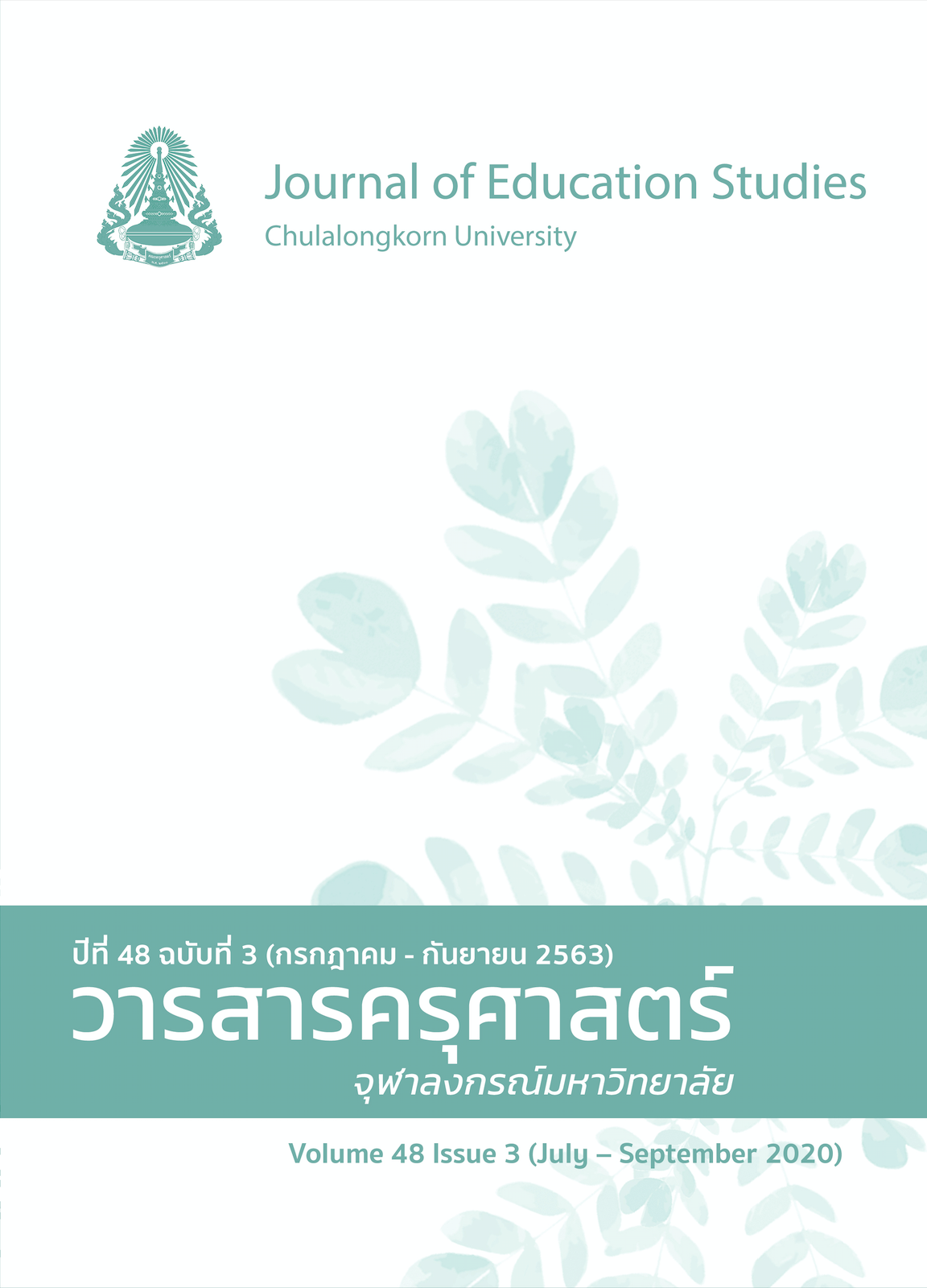Development of Thai Performing Arts Costume Subject for Undergraduate Students of Thai Performing Arts
DOI:
https://doi.org/10.14456/educu.2020.23Keywords:
development of subject, Thai performing arts costume, students of Thai performing artsAbstract
The purpose of this research was to developing Thai performing arts costume subject for Undergraduate Students. The sample of this study were specialist or artists whom expertise in creating Thai performing arts costume, selected from purposive sampling method, Creating Thai performing arts costume teacher and undergraduate Thai performing arts students. Data was gathered by using In-depth interview, Expectation questionnaires. The data was analyzed by mean and standard deviation.
The research findings were shown as follows: 1) The conclusion from the expectation questionnaires in undergraduate students, suggested that should be inserted other knowledge to develop skills in creative conservation (M = 5.00) followed by the learner likes to do actual work and applying knowledge after learning to their work (M = 4.98) 2). The interview results from expertise and specialists in Thai performing art for undergraduate students suggested 6 aspects including: 1) objectives for teaching, 2) Contents, 3) activities curricular, 4) teaching methods, 5) Evaluation, and 6) references that focused in learning process to makes the learner appreciate and can use in the occupation.
References
ธำรง บัวศรี. (2542). ทฤษฎีหลักสูตร การออกแบบและการพัฒนา (พิมพ์ครั้งที่ 2). ธนธัชการพิมพ์.
มนตรี วัดละเอียด. (2550). วิวัฒนาการการแต่งหน้าและเครื่องแต่งกายโขนละครตามแนวพระราชดําริของ สมเด็จพระนางเจ้าสิริกิติ์ พระบรมราชินีนาถ. กรุงเทพ.
ไพฑูรย์ สินลารัตน์. (2557). หลักและเทคนิคการสอนระดับอุดมศึกษา. วี.พริ้นท์.
วิจารณ์ พานิช. (2555). วิถีสร้างการเรียนรู้เพื่อศิษย์ในศตวรรษที่ 21. มูลนิธิสดศรี-สฤษดิ์วงศ์.
สงัด อุทรานันท์. (2532). เทคนิคการจัดการเรียนการสอนอย่างเป็นระบบ (พิมพ์ครั้งที่ 6). มิตรสยามการพิมพ์.
สันติ คุณประเสริฐ.(2547). การเรียนการสอนศิลปศึกษาตามแนวคิด Postmodernism. ศิลปศึกษาจากทฤษฎีสู่การสร้างสรรค์. กรุงเทพ: สำนักพิมพ์แห่งจุฬาลงกรณ์มหาวิทยาลัย.
สุดาพร ลักษณียนาวิน. (2550). แนวคิดเกี่ยวกับการเรียนการสอนในสังคมฐานความรู้. ใน ไพฑูรย์ สินลารัตน์ (บ.ก.), อาจารย์มืออาชีพ แนวคิด เครื่องมือ และการพัฒนาเครือข่ายการพัฒนาวิชาชีพอาจารย์และองค์กรอุดมศึกษาแห่งประเทศไทย (น.33-45). สำนักงานคณะกรรมการการอุดมศึกษา กระทรวงศึกษาธิการ.
สุรพล วิรุฬห์รักษ์. (2549). วิวัฒนาการนาฏศิลป์ไทยในกรุงรัตนโกสินทร์. จุฬาลงกรณ์มหาวิทยาลัย.
สำนักงานเลขาธิการสภาการศึกษา กระทรวงศึกษาธิการ. (2560). แผนการศึกษาแห่งชาติ พ.ศ. 2560-2575. http://www.onec.go.th/index.php/page/view/Outstand/2532
อาภรณ์ ใจเที่ยง. (2550). หลักการสอน (ฉบับปรับปรุง) (พิมพ์ครั้งที่ 4). โอเดียนสโตร์.
ภาษาอังกฤษ
Brookfield, S. (1984). Self-directed adult learning: A critical paradigm. Adult Education Quarterly, 35(2), 59-71.
Slavin, R. E. (1995). Cooperative learning theory research and practice. Allyn and Bacon.
Taba, H. (1962). Curriculum development: Theory and practice. Harcourt Brace & World.
Bettelle for Kids. (2013). Framework for 21st century learning. http://www.p21.org/overview
Zimmerman, B. J. (1989). A social cognitive view of self-regulated academic learning. Journal of Educational Psychology, 81(3), 329-339.
Downloads
Published
How to Cite
Issue
Section
License

This work is licensed under a Creative Commons Attribution-NonCommercial-NoDerivatives 4.0 International License.




